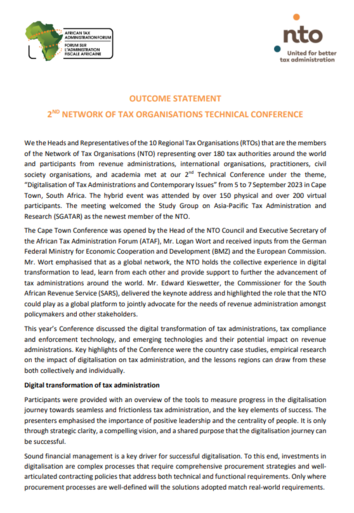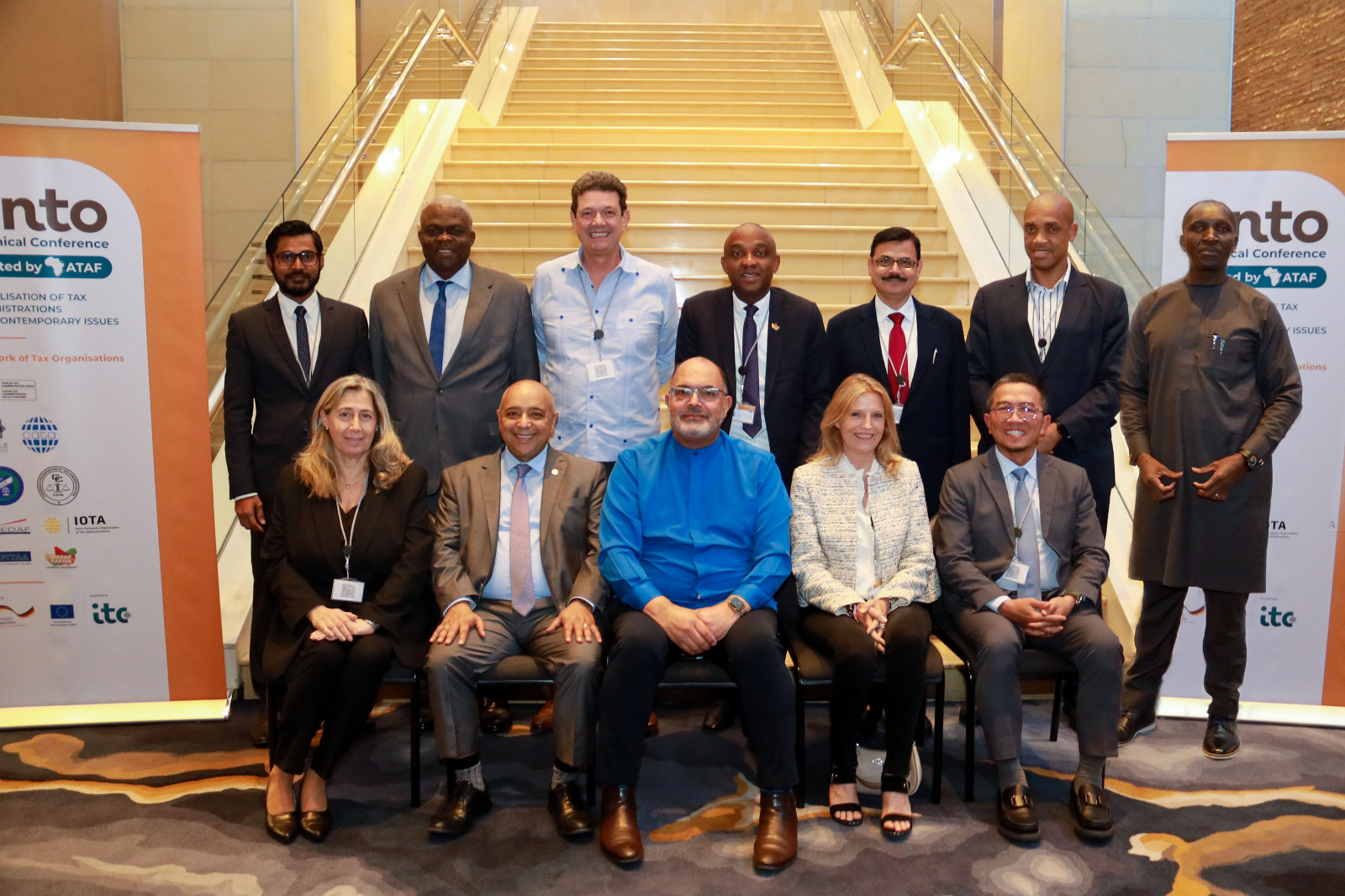
Outcome Statement of the 2nd NTO Technical Conference
OUTCOME STATEMENT
2ND NETWORK OF TAX ORGANISATIONS TECHNICAL CONFERENCE
We the Heads and Representatives of the 10 Regional Tax Organisations (RTOs) that are the members of the Network of Tax Organisations (NTO) representing over 180 tax authorities around the world and participants from revenue administrations, international organisations, practitioners, civil society organisations, and academia met at our 2nd Technical Conference under the theme, “Digitalisation of Tax Administrations and Contemporary Issues” from 5 to 7 September 2023 in Cape Town, South Africa. The hybrid event was attended by over 150 physical and over 200 virtual participants. The meeting welcomed the Study Group on Asia-Pacific Tax Administration and Research (SGATAR) as the newest member of the NTO.
The Cape Town Conference was opened by the Head of the NTO Council and Executive Secretary of the African Tax Administration Forum (ATAF), Mr. Logan Wort and received inputs from the German Federal Ministry for Economic Cooperation and Development (BMZ) and the European Commission. Mr. Wort emphasised that as a global network, the NTO holds the collective experience in digital transformation to lead, learn from each other and provide support to further the advancement of tax administrations around the world. Mr. Edward Kieswetter, the Commissioner for the South African Revenue Service (SARS), delivered the keynote address and highlighted the role that the NTO could play as a global platform to jointly advocate for the needs of revenue administration amongst policymakers and other stakeholders.
This year’s Conference discussed the digital transformation of tax administrations, tax compliance and enforcement technology, and emerging technologies and their potential impact on revenue administrations. Key highlights of the Conference were the country case studies, empirical research on the impact of digitalisation on tax administration, and the lessons regions can draw from these both collectively and individually.
Digital transformation of tax administration
Participants were provided with an overview of the tools to measure progress in the digitalisation journey towards seamless and frictionless tax administration, and the key elements of success. The presenters emphasised the importance of positive leadership and the centrality of people. It is only through strategic clarity, a compelling vision, and a shared purpose that the digitalisation journey can be successful.
Sound financial management is a key driver for successful digitalisation. To this end, investments in digitalisation are complex processes that require comprehensive procurement strategies and well-articulated contracting policies that address both technical and functional requirements. Only where procurement processes are well-defined will the solutions adopted match real-world requirements.
The discussions emphasised that digitalisation should be viewed as the driver of change rather than the change itself. Too often authorities identify technologies they want to adopt rather than the problem or process that can be resolved or enhanced. Importantly, the meeting recognised the varied levels of digitalisation in different jurisdictions. We unanimously sighted collaboration of the members of NTO as critical in supporting each other to achieve digitalisation faster.
Tax compliance and enforcement technology
The Conference highlighted the transformative role of technology in reshaping tax compliance, spotlighting the efficiency, and empowerment brought about by e-filing and modern data collection methods. To truly empower taxpayers, administrations must harness data, focusing on its integrity, and converting it into actionable strategies through data science and engineering.
Emerging technologies and their potential impact on revenue administrations
New technologies present opportunities for tax authorities to improve data management and analytics, resulting in improved detection of non-compliance and increased efficiency in tax administration. The success of the application of new technologies is dependent on high-quality data, and an entrenched data culture and literacy within authorities.
The Conference deliberated on the need for tax officials to expand their skills to include an understanding of dynamic business models, technological competence, and data savviness, in addition to traditional tax administration and audit skillsets.
During the closing session, the NTO Council:
- Conveyed its appreciation for the support provided to the NTO Secretariat by the BMZ/European Union Commission and NTO members committed to working on the development of its future.
- Expressed the need for, and committed to closer cooperation, complementarity, and collaboration between NTO members.
- Acknowledged and appreciated the work being done by other international tax organisations and pledged that the NTO will work closely with these organisations in the fulfilment of its mandate. In this regard, the Council reiterated the need for enhanced coordination of activities and regular consultations between the NTO and these organisations especially in the area of capacity building in order to avoid potential duplications of roles and activities and thus ensure optimal use of resources.
Delegates expressed the need for closer cooperation between tax authorities of all countries as well as the need to share knowledge and experiences. They called on the NTO to play a role in international cooperation in the digital transformation of tax administrations and to enhance its work across the tax spectrum to support the work of its member RTOs.
Finally, we are very grateful to ATAF for having hosted the 2nd Technical Conference and we look forward to future engagements.
